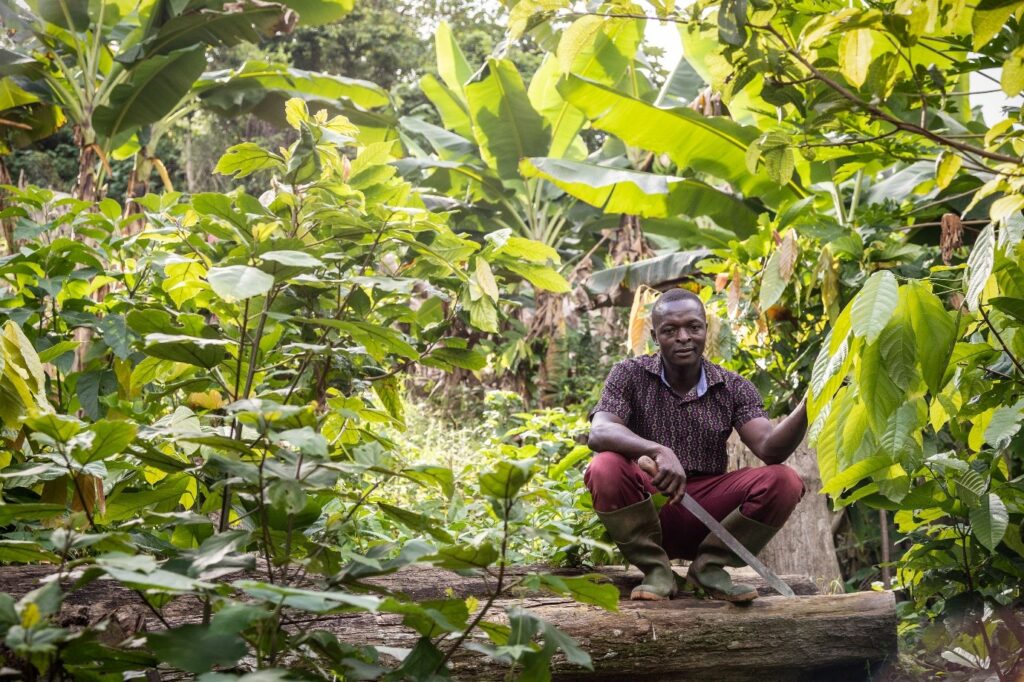Fairtrade cocoa farmer Sadick Abanga, Ghana. Photo credit © Chris Terry
Cocoa farmers who were paid a living income reference price earned on average approximately 15 percent more compared to government regulated farmgate prices, according to a new report published by Fairtrade International.
The Fairtrade Living Income Progress Report 2023 includes results from the first two years of the Fairtrade Living Income Learning project. The project’s partners – Tony’s Open Chain, Ben & Jerry’s, and six Fairtrade certified cocoa cooperatives in Côte d’Ivoire – worked together to improve farm profitability towards target values for cocoa yields, crop diversification, and cost efficiency, alongside the two companies paying the Living Income Reference Price for the cocoa they sourced from these cooperatives.
The findings in the report showed that after the first year, 21 percent of farmer households reached a living income with an average of $4,735. The number fell to 18 percent in the second year with an average of $4,220, but severe droughts and lower farmgate prices set by government were partially responsible.
Overall, though, the report noted that with an average of 48 percent of total production volumes sold at the reference price, farmers earned an average 15 percent more for their cocoa sold. Moreover, the cooperatives that sold an even larger share of their volumes at the reference price earned up to 47 percent higher cocoa revenues.
“We are happy with these early results from our pilot projects confirming a significant direct impact of the Living Income Reference Price on farmers’ incomes,” says Carla Veldhuyzen van Zanten, Fairtrade International’s Senior Advisor Sustainable Livelihoods. “We are still in the process of unravelling the indirect effects of a secured higher price, but we already see strong indications that farmers invest more in their farms and improve yields as well.”
The progress report outlines the wide range of activities and developments by Fairtrade and its partners. The Living Income Learning Project implements Fairtrade International’s holistic Living Income strategy, which encompasses three interconnected building blocks: sustainable production, responsible procurement, and enabling environment.
1. The first block, sustainable production, works to optimise farm yields, efficiency, and resilience in harmony with the environment. The report highlights several cocoa cooperatives in West Africa that organised and employed “labour brigades” that travel to members’ farms and take-care of productivity-improving practices, such as tree-pruning. This high-quality labour is a form of contribution to farmers’ incomes and increases their yields.
2. The second block, responsible procurement, enables farmers and their organisations to plan their business and secure a decent return on their investment by establishing long-term sourcing partnerships and paying living income-based prices. In this area, the report reveals two new living income reference prices for coffee from Peru (organic) and Nicaragua (organic and conventional), bringing the total to seven coffee reference prices, in addition to prices for cocoa, vanilla and coconuts. Details of all calculations can be found on the Living Income Reference Prices page.
3. The third block, enabling environment, seeks to create the conditions for farmers to produce sustainably and helps to drive collective action by putting in place policies that level the playing field for the entire industry. The report highlights the outcome of a Fairtrade-convened cocoa producer-led summit in Abidjan, which resulted in a joint declaration calling on companies to engage in long-term sourcing partnerships and pay fair prices, as well as on policymakers to enact legislation that recognises a living income as a human right, among other things.
ENDS
For more information contact: media@fairtrade.org.uk
Notes to editors
About Fairtrade
Fairtrade is an independent non-profit organisation representing more than two million farmers and workers worldwide. It owns the FAIRTRADE Mark, a registered trademark appearing on more than 30,000 products, which is the most recognised and trusted sustainability label in the world. Fairtrade collaborates with businesses, engage shoppers, activate civil society, and enable producers to take control in order to bring about a fair, sustainable future — a future rooted in social justice.
About Living Income Reference Prices
Sustainable pricing is a critical component of Fairtrade’s Living Income Strategy. A living income reference price is the price a typical farmer household with a viable farm size and a sustainable productivity level needs to learn a living income from the sales of their crop. The price discovery price is based on an assessment of current yields, cultivated land areas and farm investments.
